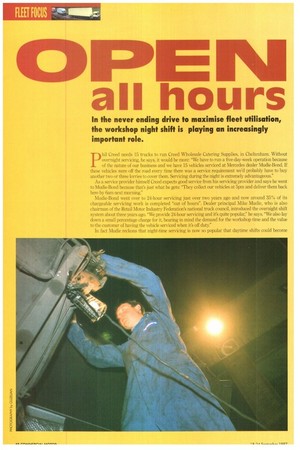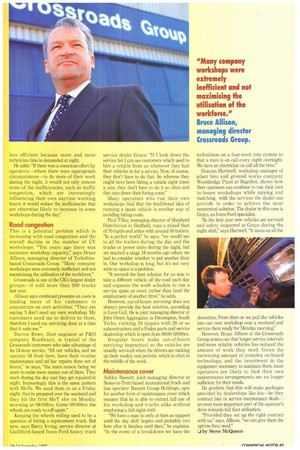all hours
Page 50

Page 51

If you've noticed an error in this article please click here to report it so we can fix it.
phil Creed needs 15 trucks to run Creed Wholesale Catering Supplies, in Cheltenham. Without overnight servicing, he says, it would be more: "We have to run a five-day-week operation because of the nature of our business and we have 15 vehicles serviced at Mercedes dealer Mudie.Bonci. If these vehicles were off the road every time there was a service requirement we'd probably have to buy another two or three lorries to cover them. Servicing during the night is extremely advantageous."
As a service provider himself Creed expects good service from his servicing provider and says he went to Mudie-Bond because that's just what he gets: "They collect our vehicles at 5pm and deliver them back here by 6am next morning."
Mudie-Bond went over to 24-hour servicing just over two years ago and now around 35% of its chargeable servicing work is completed "out of hours". Dealer principal Mike Muclie, who is also chairman of the Retail Motor Industry Federation's national truck council, introduced the overnight shift system about three years ago. "We provide 24-hour servicing and it's quite popular," he says. "We also lay down a small percentage charge for it, bearing in mind the demand for the workshop time and the value to the customer of having the vehicle serviced when it's off duty" In fact Mudie reckons that night-time servicing is now so popular that daytime shifts could become less efficient because more and more technician time is demanded at night.
He adds: "If there was a conscious effort by operators—where there were appropriate circumstances—to do more of their work during the night, it would not only remove some of the inefficiencies, such as traffic congestion, which are increasingly influencing their own daytime working hours; it would reduce the inefficiencies that are otherwise likely to increase in some workshops during the day."
This is a potential problem which is increasing with road congestion and the overall decline in the number of CV workshops. "Ten years ago there was excessive workshop capacity," says Bruce Allison, managing director of Yorkshire. based Crossroads Group. "Many company workshops were extremely inefficient and not maximising the utilisation of the workforce."
Crossroads is one of the UK's largest dealer groups—it sold more than 900 trucks last year.
Allison says continual pressure on costs is leading many of his customers to concentrate on core activities: "They are saying 'I don't need my own workshop. My customers need me to deliver to them, therefore I need my servicing done at a time that it suits me."
Darren Rowe, fleet engineer at P8z0 company Roadways, is typical of the Crossroads customers who take advantage of its 24-hour service. "All our vehicles, and we operate 58 from here, have their routine maintenance and ad hoc repairs done out of hours," he says, "the main reason being we want to make more money out of them: They work during the day and they get repaired at night. Increasingly this is the same pattern with MoTs. We send them in on a Friday night, they're prepared over the weekend and they hit the first MoT slot on Monday morning at 08:00hrs. Come 09:00hrs the wheels are ready to roll again."
Keeping the wheels rolling used to be a question of hiring a replacement truck. But now, says Barry Irving, service director at Guildford-based Iveco Ford heavy truck
service dealer Grays: "If I look down the service list I can see customers which used to hire a vehicle from us whenever they had their vehicles in for a service. No of course, they don't have to do that. So whereas they might have been hiring a vehicle eight times a year, they don't have to do it so often and that cuts down their hiring costs."
Many operators who run their own workshops find that the traditional idea of running a spare vehicle is another way of avoiding hiring costs.
Paul Tilley, managing director of Shepherd Distribution in Sheffield, runs a mixed fleet of 70 rigids and artis with around 40 trailers. "In a perfect world," he says, "we would see to all the trailers during the day and the trucks or power units during the night, but we reached a stage 18 months ago where we had to consider whether to put another fitter in. Our workshop is long, but it's not very wide so space is a problem.
"It seemed the best solution for us was to take a different vehicle off the road each day and organise the work schedule to run a service spare as cover, rather than fund the employment of another fitter," he adds.
However, out.of-hours servicing does not always provide the best solution, according to Leon Gull. He is joint managing director at John Owen Aggregates in Dinning-ton, South Yorks, running 10 tippers with 20 or so subcontractors and a Foden parts and service dealership which is open from 06:00-18:00hrs.
Irregular hours make out-of-hours servicing impractical so the vehicles are usually serviced when the drivers are making up their weekly rest periods, which is often in the middle of the week.
Ashley Bassett, joint managing director at Stoke-on-Trent-based international truck and bus operator Bassett Group Holdings, opts for another form of maintenance cover which ensures that he is able to extract full use of his workshop and trucks alike without employing a full night shift.
"We have a man in early at Gam as support until the day shift begins and probably two here after it finishes until 8pm," he explains. "In the event of a breakdown we have the technicians on a four-week rota system so that a man is on call every night overnight. We have an electrician on call all the time."
Duncan Hartwell, workshop manager of plant hire and ground works company Wooldridge Plant at Bagshot, shows how fleet operators can continue to run their own in-house workshops while mixing and matching with the services the dealer can provide in order to achieve the most economical solution. The dealer in this case is Grays, an Iveco Ford specialist.
"In the first year new vehicles are serviced and safety inspected at Grays during the night shift," says Hartwell. "It saves us all the
downtime. From then on we pull the vehicles into our own workshop over a weekend and service them ready for Monday morning."
However, Bruce Allison at the Crossroads Group points out that longer service intervals and more reliable vehicles has reduced the amount of work they need. Given the increasing amount of complex on-board technology, and the investment in the equipment necessary to maintain them, more operators are likely to find their own maintenance arrangements are no longer sufficient for their needs.
He predicts that this will make packages provided by dealerships like his—be they contract hire or service maintenance deals— an even more important part of the operator's drive towards full fleet utilisation.
"Provided they set up the right contract with us," says, Allison, "we can give them the uptime they need."
Li by Steve McQueen
















































































































